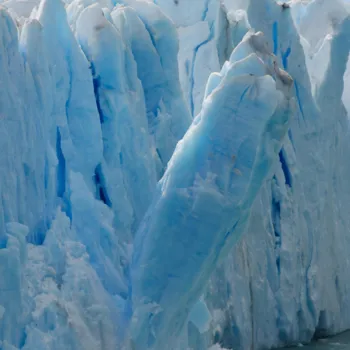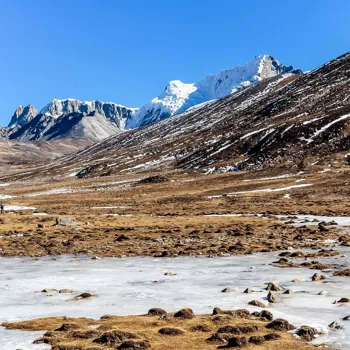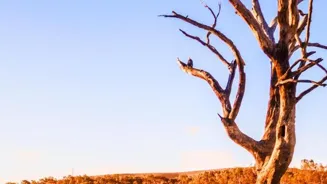Discover the impact of climate change on Mother Earth & why every Indian should care. Read on to learn more!
Namaste readers! The weather's been acting up lately, hasn't it? Unseasonal rains, scorching
summers, and floods that seem to come out of nowhere. It's not just a random thing; it's climate change knocking on our door, folks.

This climate change, or jalvayu parivartan as we say in Hindi, is impacting our planet in ways that are becoming harder and harder to ignore. Let's break down eight crucial insights in simple terms, so we all understand what's going on and, more importantly, what we can do about it.
Climate Change is here!
Earth's temperature rising due to human actions causing climate imbalance
The biggest news is that our planet is getting hotter, like when your chai boils over if you are not careful. Scientists, using gizmos and tools, have been checking the earth's temperature over many years. The measurement says that the world is getting hotter and hotter.
This warming is not happening just because of normal weather pattern. It is happening because of human actions such as burning of fossil fuels such as coal. When we use these fuels, they send carbon dioxide into the air, which is like a blanket, which in turn traps the heat inside the planet.
So the planet goes from shilma cold to delhi scorching heat during summer. The bad thing is that it's not equal everywhere. Some place is too hot and some places too cold and snowy. This causes climate imbalance, and many kinds of natural disasters, such as floods and storms.
It's time we take this temperature seriously and cool things down.
Himalayan glaciers melting fast, threatening water supply in India
The majestic Himalayas, which provide water to millions in India and beyond, are under serious threat. The glaciers, these huge ice sheets, are melting at an alarming rate faster than you can eat a plate of hot jalebis.

As the planet's temperature rises, these icy giants are shrinking, like an ice candy in summer. This can lead to several problems such as floods and drought, which means too much water at the wrong time and not enough water at the right time.
The melting of glaciers is not just a problem for the mountain community. It's actually a national problem, affecting our agriculture, our water supply and also the well being of our people across India.
We need to protect our Himalayas, respect nature and find ways to reduce carbon footprint that can protect this important source of water.
India's changing monsoon patterns impact agriculture and daily life
India's monsoon is the lifeline of its agriculture, but climate change is making it unpredictable. We are like a family waiting for arrival of expected guests, but we are never sure exactly when they will arrive. This is what is exactly happening with monsoon.
Sometimes the rain comes too early, sometimes too late, and when it does come, it pours down in really heavy amounts that are difficult to manage, causing floods. Other times, it just doesn't come at all, leading to droughts which can lead to lack of proper food for us.
The change in rainfall can affect our crops, our farmers, and our entire economy. This impacts our day to day life. It's time to adapt how we farm, making sure we collect the water and use it wisely, and most importantly respect the nature that provides us food.
India's coastline faces rising sea levels endangering cities and communities
India has a beautiful coastline which stretches for thousands of kilometres, is now facing the threat of rising sea levels. Imagine our coastline is like our house and rising water levels are like floods coming closer and closer to our doorstep.
As the ice melts and the oceans warm and expand, the sea is swallowing the land. This can damage our cities which are close the seaside. It can remove our people who live by the sea and damage our environment.
Places like Mumbai, Chennai, and Kolkata are more prone to getting hit by rising sea levels. We need to protect our coastal areas as this has become crucial. We need to build strong barriers and plan our cities in a smart way, so we can save our coastal communities and save our resources.
Rising intensity of extreme weather calls for preparedness and unity
Extreme weather events, like heatwaves and cyclones, are becoming more frequent and intense, causing destruction and loss of life. Heatwaves can make it difficult to work in the sun, especially for farmers and labourers.
Cyclones destroy houses, crops, and infrastructure, leaving many people homeless and hopeless. These events remind us of nature's power and vulnerability as a whole.
To prepare for these extreme conditions, we need to be ready by building shelters, planting trees to keep the environment cool and make sure people are aware of any weather updates through radio or television. It is important we face these difficulties with courage and working together.
Climate change impacts agriculture in India, threatening food security
Climate change is seriously affecting agriculture in India, which is bad news for a country that relies heavily on farming. Unpredictable weather patterns such as floods, droughts and extreme weather makes it hard to grow crops.
Changes in temperature affect the soil which can cause diseases in plants and make it hard to manage. A decrease in food affect the price, which makes food unaffordable, and many people might go hungry. We need to help our farmers by giving them the tools they need to deal with these challenges.
This includes providing information, water system to help with irrigation and help produce foods that can get used to changing temperatures.
Climate change impacts health: heat illnesses, airborne diseases, pollution. Clean environment crucial
Climate change is not just about the environment; it also has serious impacts on our health. As temperatures rise, we are more likely to see heat related illnesses such as heat strokes. Also the increase in change to weather leads to airborne diseases such as malaria and dengue.
Pollution, which gets worse due to climate change, is also a bad effect on our respiratory system which can lead to asthma and lung diseases. Therefore, it is important to keep our environment clean. It is important to keep ourselves safe. We should plant trees in our community.
We should be part of any clean-up community that will help us to work together to make our community clean. It is important for us to spread the word about how to avoid getting ill and staying healthy when the climate changes.
While the problems related to climate change seems difficult to address, we can still make a difference with small changes in our daily lives. It is important to save energy, we can start by using less electricity. This can range from turning off lights when we leave the room to switching to solar power. It is also important for us to use less water. We need to use water very wisely. We need to avoid any sort of wastage pertaining to water. Reduce, Reuse recycle. It is important for us to adopt this message in our lives. When we go shopping, let us buy less plastic materials and take our own bags . Planting trees in the community will go a long way too. Trees can help keep the community cool and healthy. Let us spread the word. Talk to your family and friends on the importance of these little actions.
Climate change zaroor is scary, but not something that we cannot fix. With knowledge, action, and "sabka prayas" (everyone's effort), we can protect our beautiful planet for future generations. Jai Hind!
AI Generated Content. Glance/InMobi shall have no liability for the content












